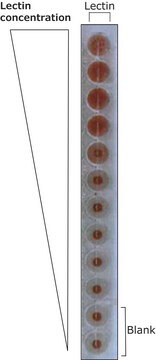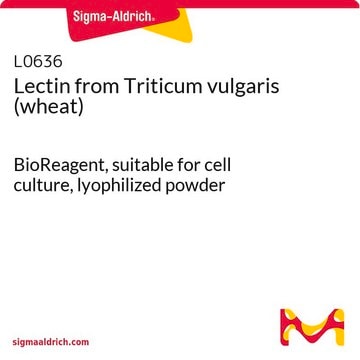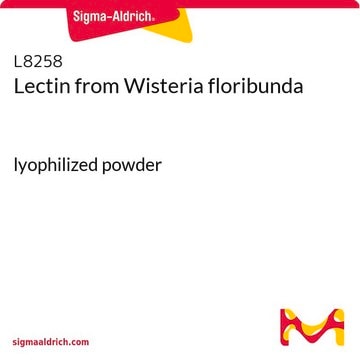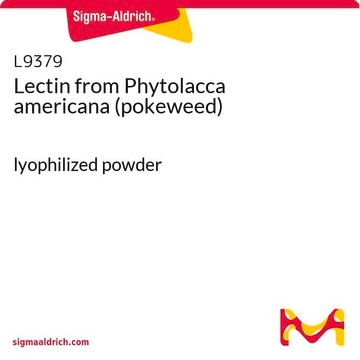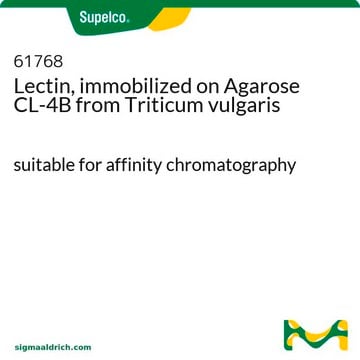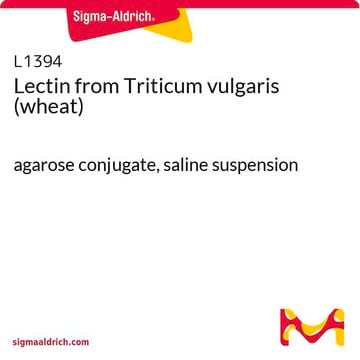61767
Lectin from Triticum vulgaris
lyophilized, ≥55% (GE), powder
Synonyme(s) :
WGA, Wheat germ agglutinin
Se connecterpour consulter vos tarifs contractuels et ceux de votre entreprise/organisme
About This Item
Produits recommandés
Source biologique
Triticum vulgaris
Forme
powder
Qualité
lyophilized
Concentration
≥55% (GE)
Technique(s)
agglutination assay: suitable using fresh human erythrocytes
Température de stockage
2-8°C
Catégories apparentées
Description générale
Lectins are carbohydrate-binding proteins, omnipresent, found in fungi, plants and animals. The structure of lectin is diversely studied in plants and animals. The secondary structure of this protein is rich in β-strands and posses a carbohydrate binding sites on the surface.
WGA is not blood group specific but has an affinity for N-acetyl-β-D-glucosaminyl residues and N-acetyl-β-D-glucosamine oligomers. WGA contains no protein-bound carbohydrate.
Application
Lectin from Triticum vulgaris has been used in bone resorption assays.
Wheat germ agglutinin conjugated to the outside surface of PLGA nanoparticles loaded with paclitaxel was used to target cancer cells that overexpress WGA-binding glycoproteins (Caco-2 and HT-29 cell lines). WGA-NP showed 50-60% greater endocytosis and intracellular retention of paclitaxel than unlabeled nanoparticles.
Actions biochimiques/physiologiques
Lectin is known to be useful in glycoconjugate characterizing, imaging and targeting. Its use in a microarray assay, enable efficient glycome profiling. This is because of its specific interaction with oligosaccharides, glycoproteins and glycolipids. In plants and fungi, lectin defends against pathogens/feeders. Lectin participates in host recognition and tissue adhesion, thereby aids in the pathogenesis of microorganism.
Autres remarques
Molecular characteristics and specificity for sugar binding
Code de la classe de stockage
11 - Combustible Solids
Classe de danger pour l'eau (WGK)
WGK 3
Point d'éclair (°F)
Not applicable
Point d'éclair (°C)
Not applicable
Équipement de protection individuelle
Eyeshields, Gloves, type N95 (US)
Faites votre choix parmi les versions les plus récentes :
Déjà en possession de ce produit ?
Retrouvez la documentation relative aux produits que vous avez récemment achetés dans la Bibliothèque de documents.
Les clients ont également consulté
Alternative NF-kB Regulates RANKL-Induced Osteoclast Differentiation and Mitochondrial Biogenesis via Independent Mechanisms
Zeng R, et al.
Journal of Bone and Mineral Research, 30(12), 2287-2299 (2015)
Chunxia Wang et al.
International journal of pharmaceutics, 400(1-2), 201-210 (2010-09-02)
The purpose of this study was to investigate the potentiation of the anticancer activity and enhanced cellular retention of paclitaxel-loaded PLGA nanoparticles after surface conjugation with wheat germ agglutinin (WGA) against colon cancer cells. Glycosylation patterns of representative colon cancer
Yinglong Zhao et al.
Frontiers in cell and developmental biology, 9, 796902-796902 (2022-02-22)
Microgravity prominently affected cardiovascular health, which was the gravity-dependent physical factor. Deep space exploration had been increasing in frequency, but heart function was susceptible to conspicuous damage and cardiac mass declined in weightlessness. Understanding of the etiology of cardiac atrophy
Wheat germ agglutinin. Molecular characteristics and specificity for sugar binding.
Y Nagata et al.
The Journal of biological chemistry, 249(10), 3116-3122 (1974-05-25)
Binding sugars: from natural lectins to synthetic receptors and engineered neolectins
Arnaud J, et al.
Chemical Society Reviews, 42(11), 4798-4813 (2013)
Notre équipe de scientifiques dispose d'une expérience dans tous les secteurs de la recherche, notamment en sciences de la vie, science des matériaux, synthèse chimique, chromatographie, analyse et dans de nombreux autres domaines..
Contacter notre Service technique


